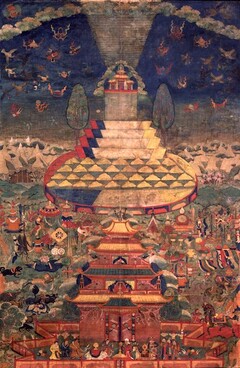Short Maṇḍala Offering
༄༅། །མཎྜལ་ཚོམ་བུ་བདུན་པ་བཞུགས།
Short Maṇḍala Offering
by Jetsün Drakpa Gyaltsen1
ས་གཞི་སྤོས་ཆུས་བྱུགས་ཤིང་མེ་ཏོག་བཀྲམ། །
sa zhi pö chü juk shing métok tram
The ground is purified with scented water and strewn with flowers.
རི་རབ་གླིང་བཞི་ཉི་ཟླས་བརྒྱན་པ་འདི། །
rirap ling zhi nyi dé gyenpa di
It is adorned with Sumeru, the king of mountains, the four quarters of the universe, and the sun and the moon;
སངས་རྒྱས་ཞིང་དུ་དམིགས་ཏེ་ཕུལ་བ་ཡིས། །
sangyé zhing du mik té pulwa yi
Thinking of it as the blessed buddha-fields, I offer it.
འགྲོ་ཀུན་རྣམ་དག་ཞིང་ལ་སྤྱོད་པར་ཤོག །
dro kun namdak zhing la chöpar shok
By virtue of this offering, may all beings here and now attain the happiness of that pure land!
ཏྲཾ་གུ་རུ་རཏྣ་མཎྜལ་པཱུ་ཛ་མེ་གྷ་ས་མུ་དྲ་ས་པ་ར་ན་ས་མ་ཡེ་ཨཱཿཧཱུྃ།
tram guru ratna mandala pudza megha samudra saparana samayé ah hung
tram guru-ratna-maṇḍala-pūjā-megha-samudra-spharaṇa-samaye āḥ hūṃ
| Rigpa Translations
Version: 1.5-20250612
- ↑ The authorship of this famous offering prayer is unclear, and it is likely that it predates Drakpa Gyaltsen (1147–1216). Still, the earliest available version, which differs slightly from the one presented here, is to be found in his consecration manual, Arga'i cho ga dang rab tu gnas pa don gsal. See Sa skya bka' 'bum (Dehra Dun: Sakya Center), 15 volumes, vol. 9, 22a.3: sa gzhi spos kyis byugs shing me tog gtor/ ri rab gling bzhis legs par brgyan pa 'di/ sangs rgyas zhing du dmigs shing phul ba yis/ 'gro rnams rnam dag zhing la spyod par shog/ Others have claimed that these four lines were composed by King Tri Songdetsen, Pakpa Lodrö Gyaltsen, the author of the Thirty-Seven Point Maṇḍala Offering, or spoken by the legendary Dharmodgata (chos 'phags) in response to requests made by the bodhisattva Sadāprarudita (rtag tu ngu), whose story of extraordinary self-sacrifice is told in the Prajñāpāramitā sūtras.
